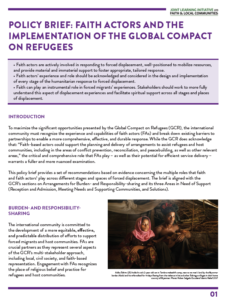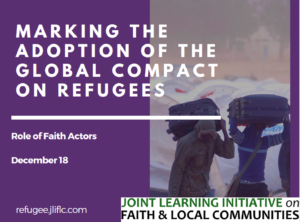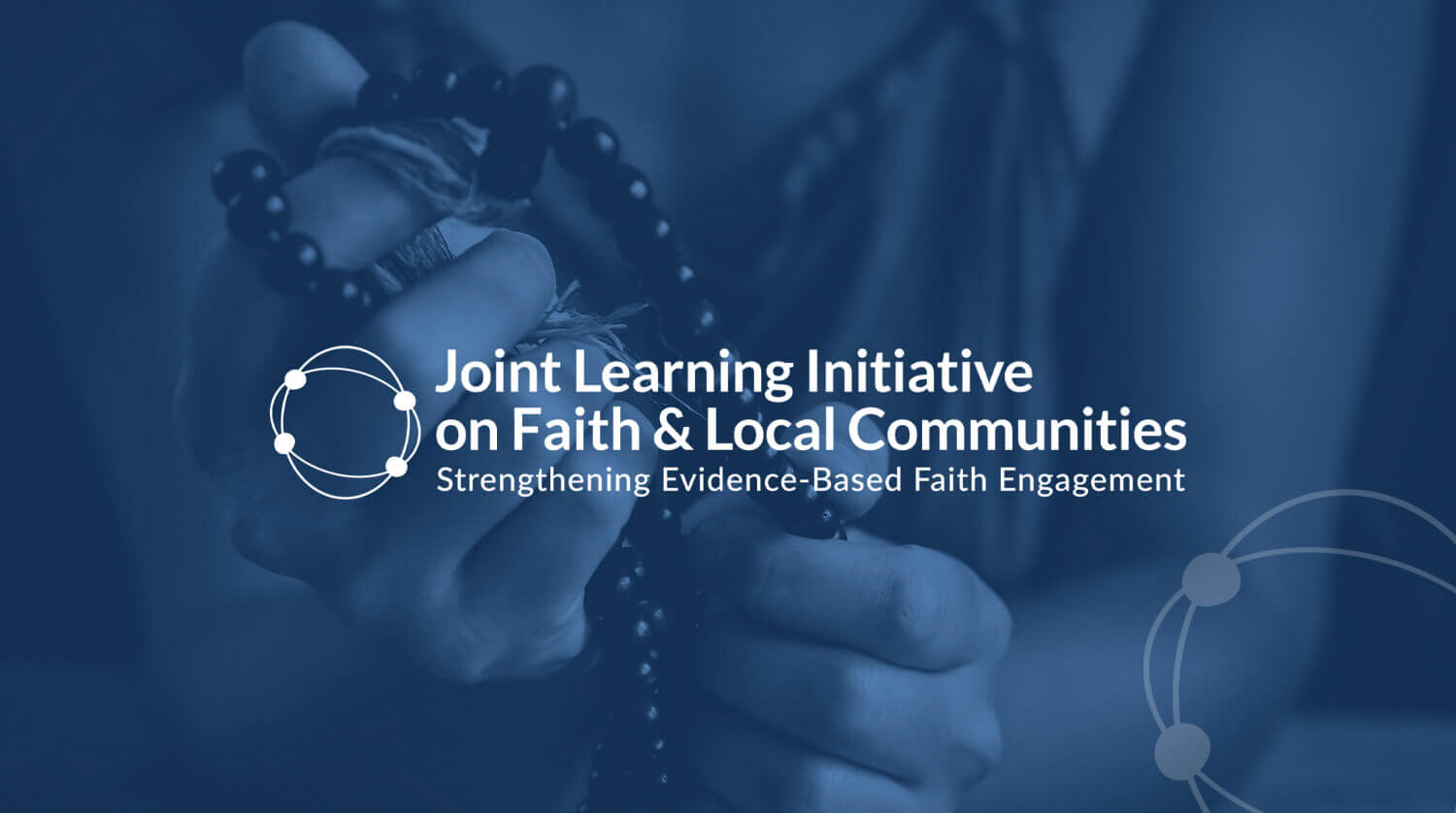The JLI recently hosted an online event to learn about the Global Compact on Refugees (GCR) adoption directly from UNHCR. JLI Research Director launched our new policy brief on faith actors and the implementation of the GCR. A range of organizations about their reflections on faith and the GCR.
Agenda and quick highlights
Welcome – Jean Duff, JLI Coordinator
Update on the GCR and role of faith actors – Rachel Criswell, NGO and Faith Liaison, UNHCR
- With increasing numbers of refugees and protracted discplacement worldwide, robust support from the start to bolster areas such as infrastructure, water supply, hospitals, schools, and roads. The Comprehensive Refugee Response Framework (CRRF) was set out in the New York Declaration (NYD) for Refugees and Migrants (Sept 2016), adopted by all 193 Member States of the UN.CRRF forms the basis of the new Global Compact on Refugees (GCR), which operationalize it through a Programme of Action and translate policies into practice. The GCR is based on the experiences in practical application of the CRRF in concrete situations in the field. The GCR calls for the response to a crisis to supplement humanitarian services with development support for refugee and host communities alike. After two years of consultation, on December 17, member states excluding the US and Hungary ratified the GCR at the UN General Assembly.
- Good practice case studies, implementation of the CRRF and further information on comprehensive refugee response can be found at http://www.globalcrrf.org
Role of Faith Actors in Implementing the Global Compact – Dr. Olivia Wilkinson, JLI Director of Research (Launch of new JLI policy brief)
- “Faith-based actors could support the planning and delivery of arrangements to assist refugees and host communities, including in the areas of conflict prevention, reconciliation, and peacebuilding, as well as other relevant areas.”– Global Compact on Refugees, UNHCR
- Roles of Faith Actors in Arrangements for Burden- and Responsibility-sharing and three Areas in Need of Support (1.Reception and Admission, 2.Meeting Needs and Supporting Communities, 3.Solutions).
- Faith actors are actively involved in responding to forced displacement, well-positioned to mobilize resources, and provide material and immaterial support to foster appropriate, tailored response.
- Faith actors’ experience and role should be acknowledged and considered in the design and implementation of every stage of the humanitarian response to forced displacement.
- Faith can play an instrumental role in forced migrants’ experiences. Stakeholders should work to more fully understand this aspect of displacement experiences and facilitate spiritual support across all stages and places of displacement.
- See Policy brief funded by the Luce Foundation for case studies and recommondations.
Learning exchange on Faith and GCR
- Emily Wei, Catholic Relief Services
- Introduced CRS’ Advocacy Efforts around the GCR and highlighted two recent publications
- Little by Little: Exploring the Impact of Social Cohesion on Refugees into Host Communities
- The Missing Link: The Role of Local Institutions in Refugee Response
- Atallah FitzGibbon, Islamic Relief Worldwide
- In 2018, Islamic Relief Worldwide organized convenings on behalf of JLI to develop a Joint Recommendation on the role of Local Faith Actors in Refugee Response
-
Recent relevant Islamic Relief Worldwide work on Faith-sensitivity in Humanitarian Response: Tools and Partnerships for Inclusion
- Dr Katherine Marshall, Berkley Center for Religion, Peace, and World Affairs & World Faiths Development Dialogue
- Presented three initiatives in research and policy in refugee issues
- Research on critical areas in refugee issues in conflict countires ex. Nigeria
- Host Country research in Kenya and third country resettlement countries ex. US: Diaspora communities and religion with Pluralism Project
- Presented a two-year project supported by Georgetown University’s Board of Regents
- various case studies underway currently for example in the northern triangle countries and reception in the US
- Need to understand better specific facets of religious approaches, including links to conflicts spurring migration and refugee flows
- Mapping of purposeful interventions, learning lessons from good and bad practice
- Need to understand better specific facets of religious approaches, including links to conflicts spurring migration and refugee flows
- Mapping of purposeful interventions, learning lessons from good and bad practice
- See Berkley Center refugee site
- G20 Recommenations
- Giulia McPherson, Jesuit Refugee Service
- Presented JRS Advocacy Efforts and
- Key Messages:
- Accompany all vulnerable people on the move and to provide for their basic needs.
- Invest in medium- and long-term development approaches to the humanitarian needs of forcibly displaced persons.
- Invest in economic and infrastructure growth within host communities.
- Share the financial burden and other costs among all countries.
- Christo Greyling, World Vision International
- Presented Initiative for Child Rights in the Global Compact coalition
- World Vision, with 13 co-organisers will implement the Faith Action for Children on the Move Action Plan
- Spiritual Support as a source of healing and resilience
- Strengthening the Continuum of Care
- Building Peace and combatting xenophobia, racism and discrimination
- Working together
- Information about the 2018 Faith Action for Children on the Move Forum see here
- Tom Albinson, International Association for Refugees (with Christine Macmillan at World Evangelical Alliance)
- Presented IAFR Continuum of Reponse. Model to help faith communities understand how to support people in recovery and long-term durable solutions
- helping people who are displaced or are refugees find support, people recovering from trauma and people who are in new contexts, people who need spiritual support and listening to those displaced to affirm their dignity be a part of the solution
- Presented IAFR Continuum of Reponse. Model to help faith communities understand how to support people in recovery and long-term durable solutions
Closing remarks and Wrap Up
Join the JLI Refugee Hub for continued joint learning
Related Resources:








